Role of Questioning: GCSE English KS4 Teaching and Learning Report
VerifiedAdded on 2022/12/30
|19
|7597
|44
Report
AI Summary
This report delves into the crucial role of teacher questioning in fostering student understanding and securing progress within the GCSE English KS4 curriculum. It begins with a comprehensive literature review, exploring the purpose and types of questioning, including 5W+1H questions and the application of Todorov's narrative theory. The review emphasizes the importance of planning and timing questions, as well as the use of both closed and open-ended questions to assess and promote higher-order thinking skills. The report also references the Department for Education's stance on questioning as a key pedagogical tool. The report then critically reflects on classroom practice, analyzing observed strategies and their connection to the literature, including Bloom's Taxonomy and dialogic teaching. The analysis considers how questioning strategies can be improved to minimize assessment for learning (AFL) and promote complex thinking, ultimately impacting future teaching practices. The report concludes with a summary of key points and a discussion of the overall impact of effective questioning on student outcomes in GCSE English KS4.
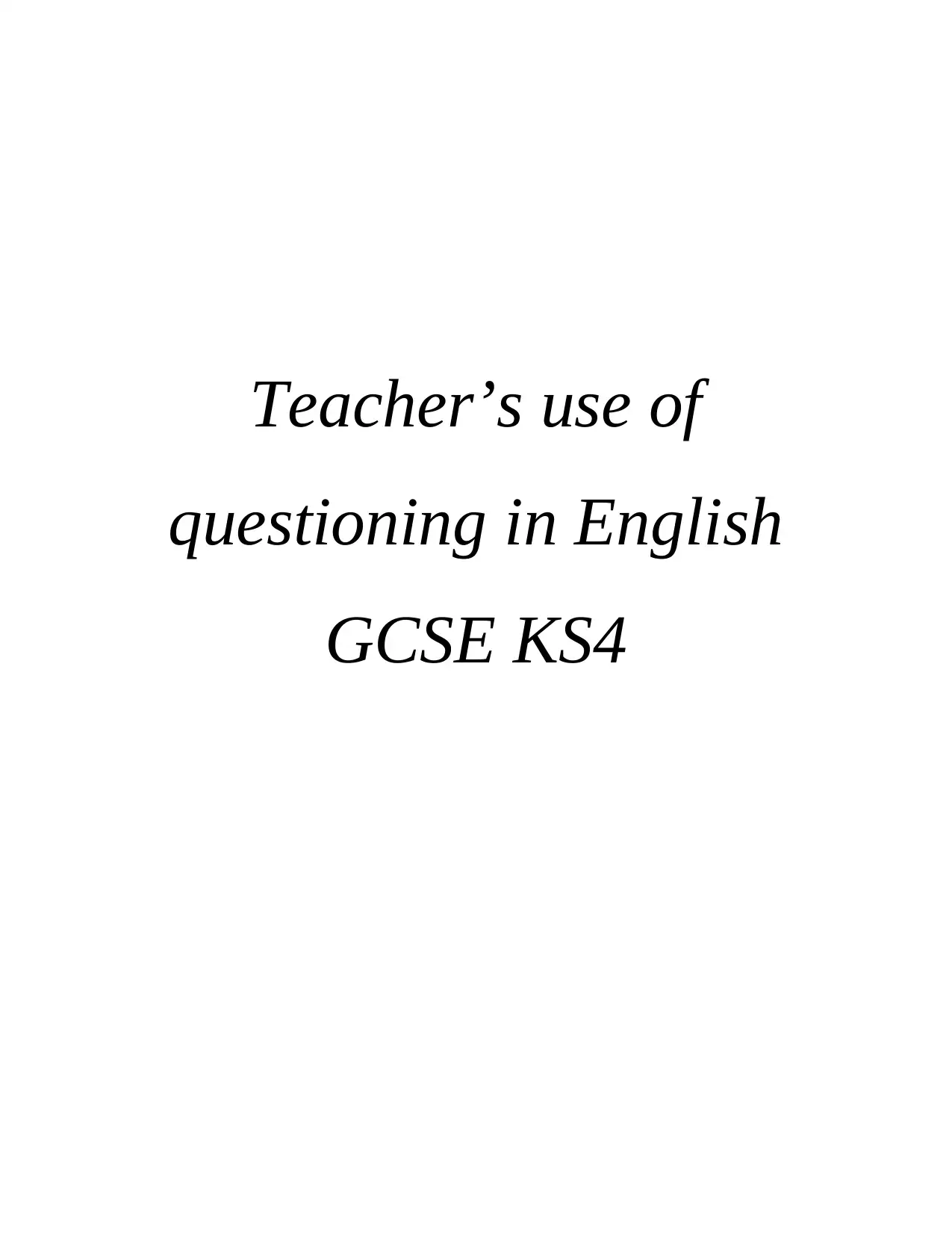
Teacher’s use of
questioning in English
GCSE KS4
questioning in English
GCSE KS4
Paraphrase This Document
Need a fresh take? Get an instant paraphrase of this document with our AI Paraphraser
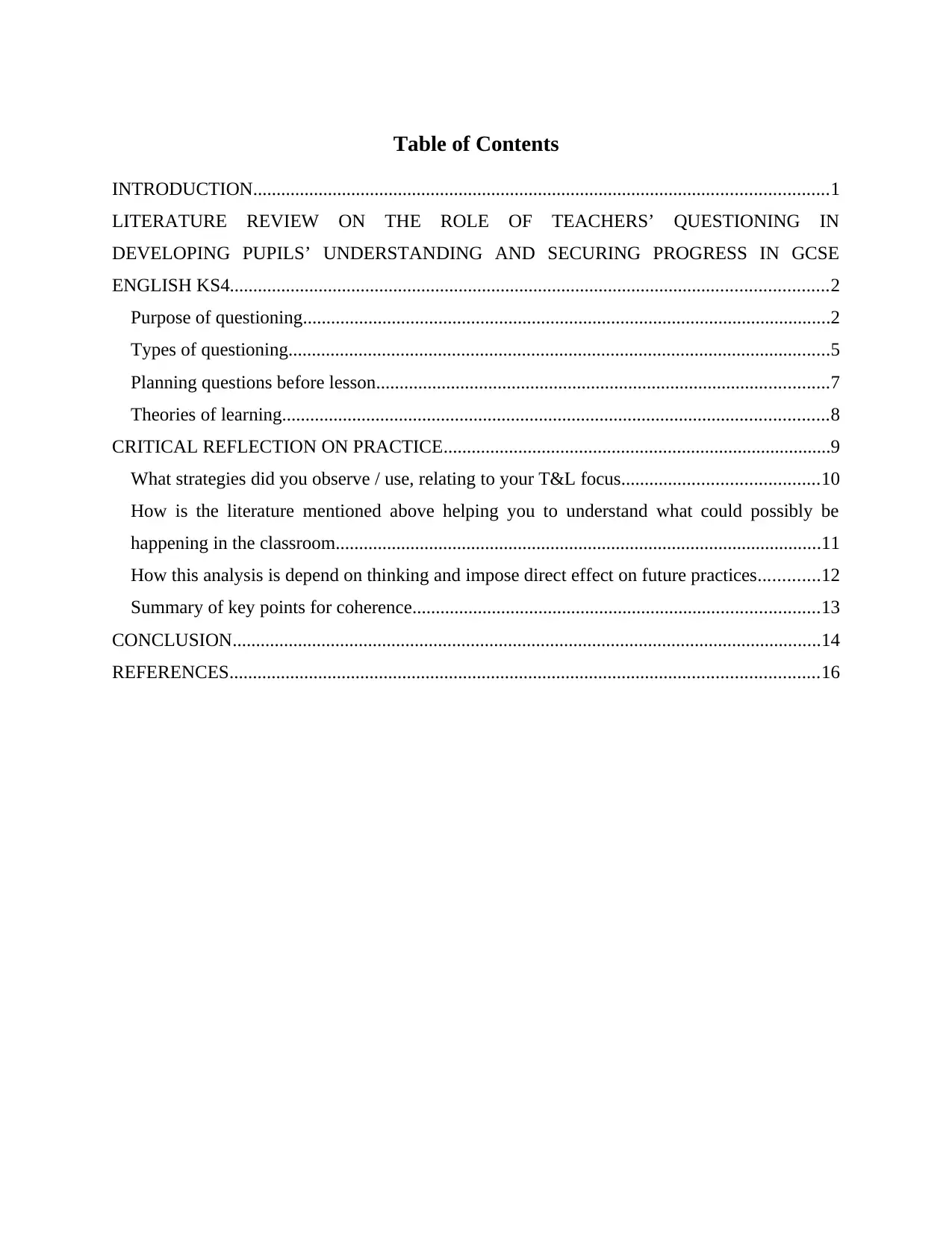
Table of Contents
INTRODUCTION...........................................................................................................................1
LITERATURE REVIEW ON THE ROLE OF TEACHERS’ QUESTIONING IN
DEVELOPING PUPILS’ UNDERSTANDING AND SECURING PROGRESS IN GCSE
ENGLISH KS4................................................................................................................................2
Purpose of questioning.................................................................................................................2
Types of questioning....................................................................................................................5
Planning questions before lesson.................................................................................................7
Theories of learning.....................................................................................................................8
CRITICAL REFLECTION ON PRACTICE...................................................................................9
What strategies did you observe / use, relating to your T&L focus..........................................10
How is the literature mentioned above helping you to understand what could possibly be
happening in the classroom........................................................................................................11
How this analysis is depend on thinking and impose direct effect on future practices.............12
Summary of key points for coherence.......................................................................................13
CONCLUSION..............................................................................................................................14
REFERENCES..............................................................................................................................16
INTRODUCTION...........................................................................................................................1
LITERATURE REVIEW ON THE ROLE OF TEACHERS’ QUESTIONING IN
DEVELOPING PUPILS’ UNDERSTANDING AND SECURING PROGRESS IN GCSE
ENGLISH KS4................................................................................................................................2
Purpose of questioning.................................................................................................................2
Types of questioning....................................................................................................................5
Planning questions before lesson.................................................................................................7
Theories of learning.....................................................................................................................8
CRITICAL REFLECTION ON PRACTICE...................................................................................9
What strategies did you observe / use, relating to your T&L focus..........................................10
How is the literature mentioned above helping you to understand what could possibly be
happening in the classroom........................................................................................................11
How this analysis is depend on thinking and impose direct effect on future practices.............12
Summary of key points for coherence.......................................................................................13
CONCLUSION..............................................................................................................................14
REFERENCES..............................................................................................................................16
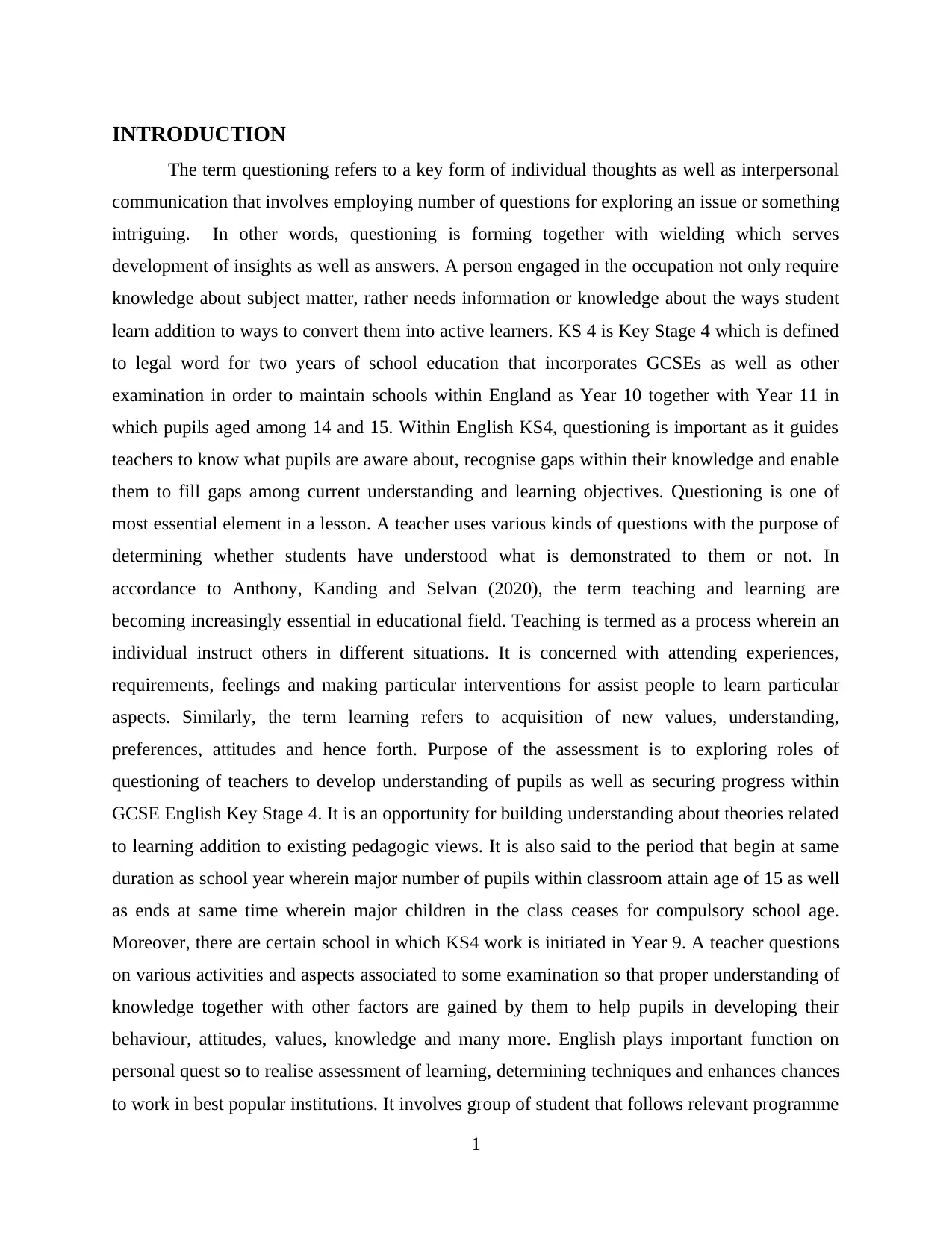
INTRODUCTION
The term questioning refers to a key form of individual thoughts as well as interpersonal
communication that involves employing number of questions for exploring an issue or something
intriguing. In other words, questioning is forming together with wielding which serves
development of insights as well as answers. A person engaged in the occupation not only require
knowledge about subject matter, rather needs information or knowledge about the ways student
learn addition to ways to convert them into active learners. KS 4 is Key Stage 4 which is defined
to legal word for two years of school education that incorporates GCSEs as well as other
examination in order to maintain schools within England as Year 10 together with Year 11 in
which pupils aged among 14 and 15. Within English KS4, questioning is important as it guides
teachers to know what pupils are aware about, recognise gaps within their knowledge and enable
them to fill gaps among current understanding and learning objectives. Questioning is one of
most essential element in a lesson. A teacher uses various kinds of questions with the purpose of
determining whether students have understood what is demonstrated to them or not. In
accordance to Anthony, Kanding and Selvan (2020), the term teaching and learning are
becoming increasingly essential in educational field. Teaching is termed as a process wherein an
individual instruct others in different situations. It is concerned with attending experiences,
requirements, feelings and making particular interventions for assist people to learn particular
aspects. Similarly, the term learning refers to acquisition of new values, understanding,
preferences, attitudes and hence forth. Purpose of the assessment is to exploring roles of
questioning of teachers to develop understanding of pupils as well as securing progress within
GCSE English Key Stage 4. It is an opportunity for building understanding about theories related
to learning addition to existing pedagogic views. It is also said to the period that begin at same
duration as school year wherein major number of pupils within classroom attain age of 15 as well
as ends at same time wherein major children in the class ceases for compulsory school age.
Moreover, there are certain school in which KS4 work is initiated in Year 9. A teacher questions
on various activities and aspects associated to some examination so that proper understanding of
knowledge together with other factors are gained by them to help pupils in developing their
behaviour, attitudes, values, knowledge and many more. English plays important function on
personal quest so to realise assessment of learning, determining techniques and enhances chances
to work in best popular institutions. It involves group of student that follows relevant programme
1
The term questioning refers to a key form of individual thoughts as well as interpersonal
communication that involves employing number of questions for exploring an issue or something
intriguing. In other words, questioning is forming together with wielding which serves
development of insights as well as answers. A person engaged in the occupation not only require
knowledge about subject matter, rather needs information or knowledge about the ways student
learn addition to ways to convert them into active learners. KS 4 is Key Stage 4 which is defined
to legal word for two years of school education that incorporates GCSEs as well as other
examination in order to maintain schools within England as Year 10 together with Year 11 in
which pupils aged among 14 and 15. Within English KS4, questioning is important as it guides
teachers to know what pupils are aware about, recognise gaps within their knowledge and enable
them to fill gaps among current understanding and learning objectives. Questioning is one of
most essential element in a lesson. A teacher uses various kinds of questions with the purpose of
determining whether students have understood what is demonstrated to them or not. In
accordance to Anthony, Kanding and Selvan (2020), the term teaching and learning are
becoming increasingly essential in educational field. Teaching is termed as a process wherein an
individual instruct others in different situations. It is concerned with attending experiences,
requirements, feelings and making particular interventions for assist people to learn particular
aspects. Similarly, the term learning refers to acquisition of new values, understanding,
preferences, attitudes and hence forth. Purpose of the assessment is to exploring roles of
questioning of teachers to develop understanding of pupils as well as securing progress within
GCSE English Key Stage 4. It is an opportunity for building understanding about theories related
to learning addition to existing pedagogic views. It is also said to the period that begin at same
duration as school year wherein major number of pupils within classroom attain age of 15 as well
as ends at same time wherein major children in the class ceases for compulsory school age.
Moreover, there are certain school in which KS4 work is initiated in Year 9. A teacher questions
on various activities and aspects associated to some examination so that proper understanding of
knowledge together with other factors are gained by them to help pupils in developing their
behaviour, attitudes, values, knowledge and many more. English plays important function on
personal quest so to realise assessment of learning, determining techniques and enhances chances
to work in best popular institutions. It involves group of student that follows relevant programme
1
⊘ This is a preview!⊘
Do you want full access?
Subscribe today to unlock all pages.

Trusted by 1+ million students worldwide
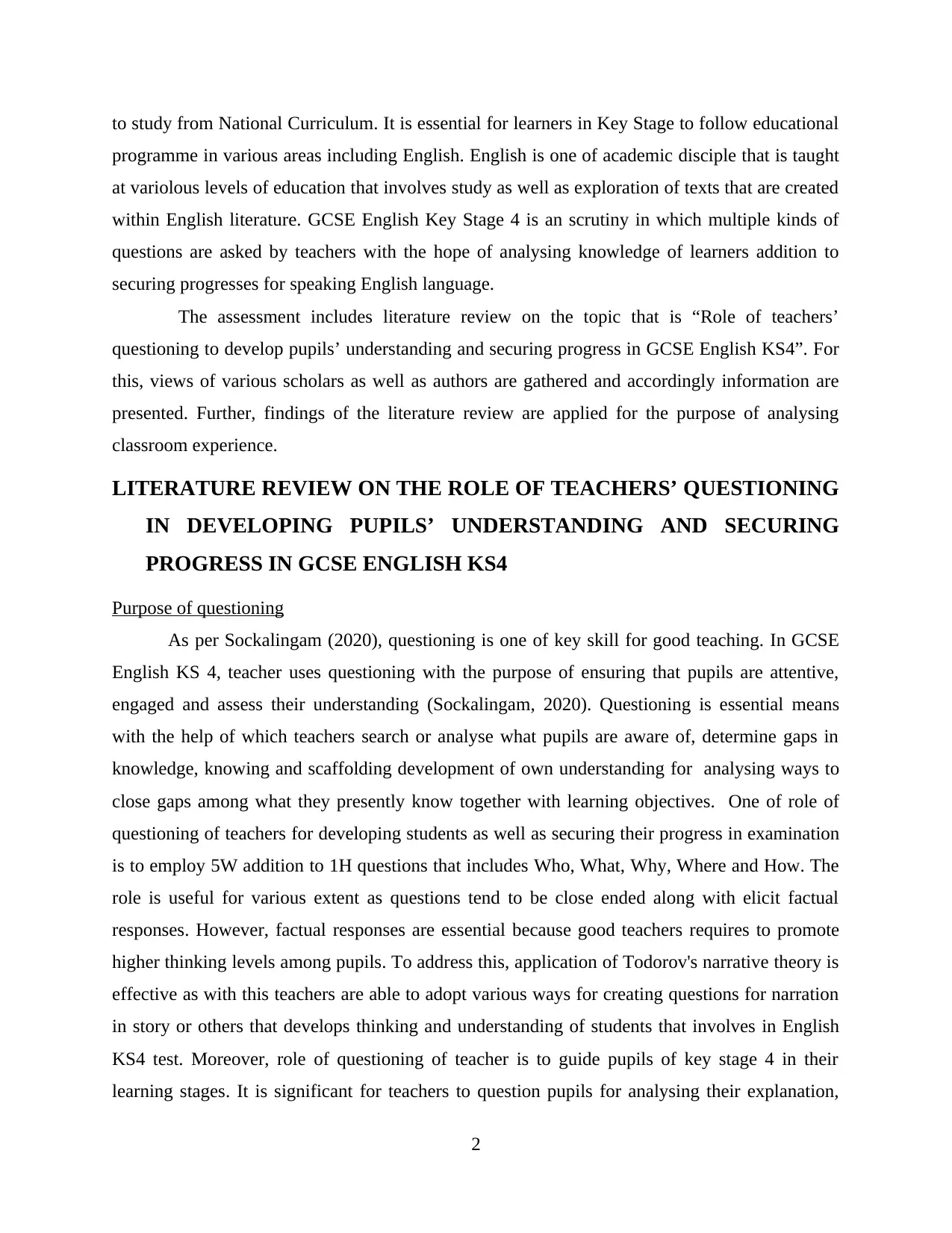
to study from National Curriculum. It is essential for learners in Key Stage to follow educational
programme in various areas including English. English is one of academic disciple that is taught
at variolous levels of education that involves study as well as exploration of texts that are created
within English literature. GCSE English Key Stage 4 is an scrutiny in which multiple kinds of
questions are asked by teachers with the hope of analysing knowledge of learners addition to
securing progresses for speaking English language.
The assessment includes literature review on the topic that is “Role of teachers’
questioning to develop pupils’ understanding and securing progress in GCSE English KS4”. For
this, views of various scholars as well as authors are gathered and accordingly information are
presented. Further, findings of the literature review are applied for the purpose of analysing
classroom experience.
LITERATURE REVIEW ON THE ROLE OF TEACHERS’ QUESTIONING
IN DEVELOPING PUPILS’ UNDERSTANDING AND SECURING
PROGRESS IN GCSE ENGLISH KS4
Purpose of questioning
As per Sockalingam (2020), questioning is one of key skill for good teaching. In GCSE
English KS 4, teacher uses questioning with the purpose of ensuring that pupils are attentive,
engaged and assess their understanding (Sockalingam, 2020). Questioning is essential means
with the help of which teachers search or analyse what pupils are aware of, determine gaps in
knowledge, knowing and scaffolding development of own understanding for analysing ways to
close gaps among what they presently know together with learning objectives. One of role of
questioning of teachers for developing students as well as securing their progress in examination
is to employ 5W addition to 1H questions that includes Who, What, Why, Where and How. The
role is useful for various extent as questions tend to be close ended along with elicit factual
responses. However, factual responses are essential because good teachers requires to promote
higher thinking levels among pupils. To address this, application of Todorov's narrative theory is
effective as with this teachers are able to adopt various ways for creating questions for narration
in story or others that develops thinking and understanding of students that involves in English
KS4 test. Moreover, role of questioning of teacher is to guide pupils of key stage 4 in their
learning stages. It is significant for teachers to question pupils for analysing their explanation,
2
programme in various areas including English. English is one of academic disciple that is taught
at variolous levels of education that involves study as well as exploration of texts that are created
within English literature. GCSE English Key Stage 4 is an scrutiny in which multiple kinds of
questions are asked by teachers with the hope of analysing knowledge of learners addition to
securing progresses for speaking English language.
The assessment includes literature review on the topic that is “Role of teachers’
questioning to develop pupils’ understanding and securing progress in GCSE English KS4”. For
this, views of various scholars as well as authors are gathered and accordingly information are
presented. Further, findings of the literature review are applied for the purpose of analysing
classroom experience.
LITERATURE REVIEW ON THE ROLE OF TEACHERS’ QUESTIONING
IN DEVELOPING PUPILS’ UNDERSTANDING AND SECURING
PROGRESS IN GCSE ENGLISH KS4
Purpose of questioning
As per Sockalingam (2020), questioning is one of key skill for good teaching. In GCSE
English KS 4, teacher uses questioning with the purpose of ensuring that pupils are attentive,
engaged and assess their understanding (Sockalingam, 2020). Questioning is essential means
with the help of which teachers search or analyse what pupils are aware of, determine gaps in
knowledge, knowing and scaffolding development of own understanding for analysing ways to
close gaps among what they presently know together with learning objectives. One of role of
questioning of teachers for developing students as well as securing their progress in examination
is to employ 5W addition to 1H questions that includes Who, What, Why, Where and How. The
role is useful for various extent as questions tend to be close ended along with elicit factual
responses. However, factual responses are essential because good teachers requires to promote
higher thinking levels among pupils. To address this, application of Todorov's narrative theory is
effective as with this teachers are able to adopt various ways for creating questions for narration
in story or others that develops thinking and understanding of students that involves in English
KS4 test. Moreover, role of questioning of teacher is to guide pupils of key stage 4 in their
learning stages. It is significant for teachers to question pupils for analysing their explanation,
2
Paraphrase This Document
Need a fresh take? Get an instant paraphrase of this document with our AI Paraphraser
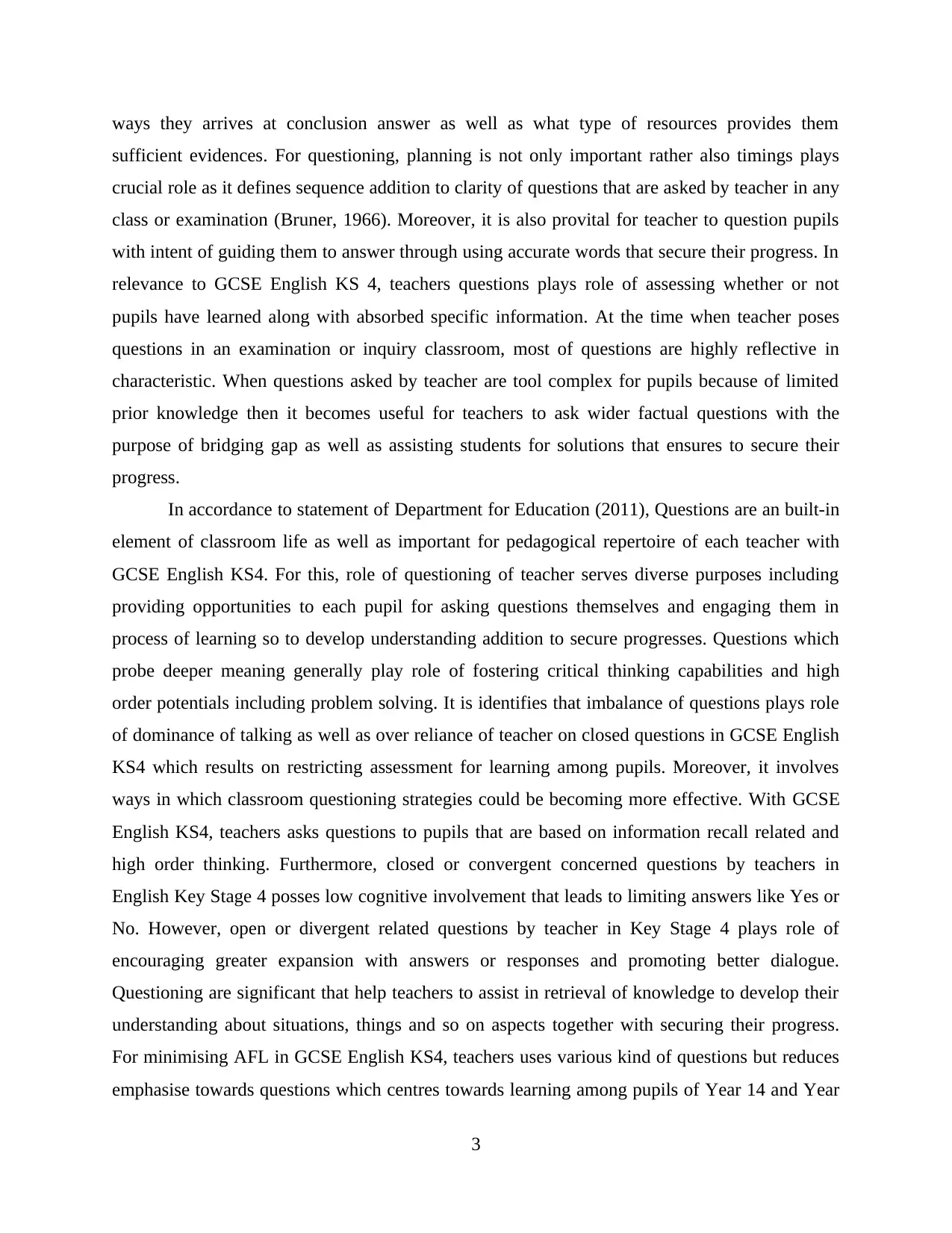
ways they arrives at conclusion answer as well as what type of resources provides them
sufficient evidences. For questioning, planning is not only important rather also timings plays
crucial role as it defines sequence addition to clarity of questions that are asked by teacher in any
class or examination (Bruner, 1966). Moreover, it is also provital for teacher to question pupils
with intent of guiding them to answer through using accurate words that secure their progress. In
relevance to GCSE English KS 4, teachers questions plays role of assessing whether or not
pupils have learned along with absorbed specific information. At the time when teacher poses
questions in an examination or inquiry classroom, most of questions are highly reflective in
characteristic. When questions asked by teacher are tool complex for pupils because of limited
prior knowledge then it becomes useful for teachers to ask wider factual questions with the
purpose of bridging gap as well as assisting students for solutions that ensures to secure their
progress.
In accordance to statement of Department for Education (2011), Questions are an built-in
element of classroom life as well as important for pedagogical repertoire of each teacher with
GCSE English KS4. For this, role of questioning of teacher serves diverse purposes including
providing opportunities to each pupil for asking questions themselves and engaging them in
process of learning so to develop understanding addition to secure progresses. Questions which
probe deeper meaning generally play role of fostering critical thinking capabilities and high
order potentials including problem solving. It is identifies that imbalance of questions plays role
of dominance of talking as well as over reliance of teacher on closed questions in GCSE English
KS4 which results on restricting assessment for learning among pupils. Moreover, it involves
ways in which classroom questioning strategies could be becoming more effective. With GCSE
English KS4, teachers asks questions to pupils that are based on information recall related and
high order thinking. Furthermore, closed or convergent concerned questions by teachers in
English Key Stage 4 posses low cognitive involvement that leads to limiting answers like Yes or
No. However, open or divergent related questions by teacher in Key Stage 4 plays role of
encouraging greater expansion with answers or responses and promoting better dialogue.
Questioning are significant that help teachers to assist in retrieval of knowledge to develop their
understanding about situations, things and so on aspects together with securing their progress.
For minimising AFL in GCSE English KS4, teachers uses various kind of questions but reduces
emphasise towards questions which centres towards learning among pupils of Year 14 and Year
3
sufficient evidences. For questioning, planning is not only important rather also timings plays
crucial role as it defines sequence addition to clarity of questions that are asked by teacher in any
class or examination (Bruner, 1966). Moreover, it is also provital for teacher to question pupils
with intent of guiding them to answer through using accurate words that secure their progress. In
relevance to GCSE English KS 4, teachers questions plays role of assessing whether or not
pupils have learned along with absorbed specific information. At the time when teacher poses
questions in an examination or inquiry classroom, most of questions are highly reflective in
characteristic. When questions asked by teacher are tool complex for pupils because of limited
prior knowledge then it becomes useful for teachers to ask wider factual questions with the
purpose of bridging gap as well as assisting students for solutions that ensures to secure their
progress.
In accordance to statement of Department for Education (2011), Questions are an built-in
element of classroom life as well as important for pedagogical repertoire of each teacher with
GCSE English KS4. For this, role of questioning of teacher serves diverse purposes including
providing opportunities to each pupil for asking questions themselves and engaging them in
process of learning so to develop understanding addition to secure progresses. Questions which
probe deeper meaning generally play role of fostering critical thinking capabilities and high
order potentials including problem solving. It is identifies that imbalance of questions plays role
of dominance of talking as well as over reliance of teacher on closed questions in GCSE English
KS4 which results on restricting assessment for learning among pupils. Moreover, it involves
ways in which classroom questioning strategies could be becoming more effective. With GCSE
English KS4, teachers asks questions to pupils that are based on information recall related and
high order thinking. Furthermore, closed or convergent concerned questions by teachers in
English Key Stage 4 posses low cognitive involvement that leads to limiting answers like Yes or
No. However, open or divergent related questions by teacher in Key Stage 4 plays role of
encouraging greater expansion with answers or responses and promoting better dialogue.
Questioning are significant that help teachers to assist in retrieval of knowledge to develop their
understanding about situations, things and so on aspects together with securing their progress.
For minimising AFL in GCSE English KS4, teachers uses various kind of questions but reduces
emphasise towards questions which centres towards learning among pupils of Year 14 and Year
3
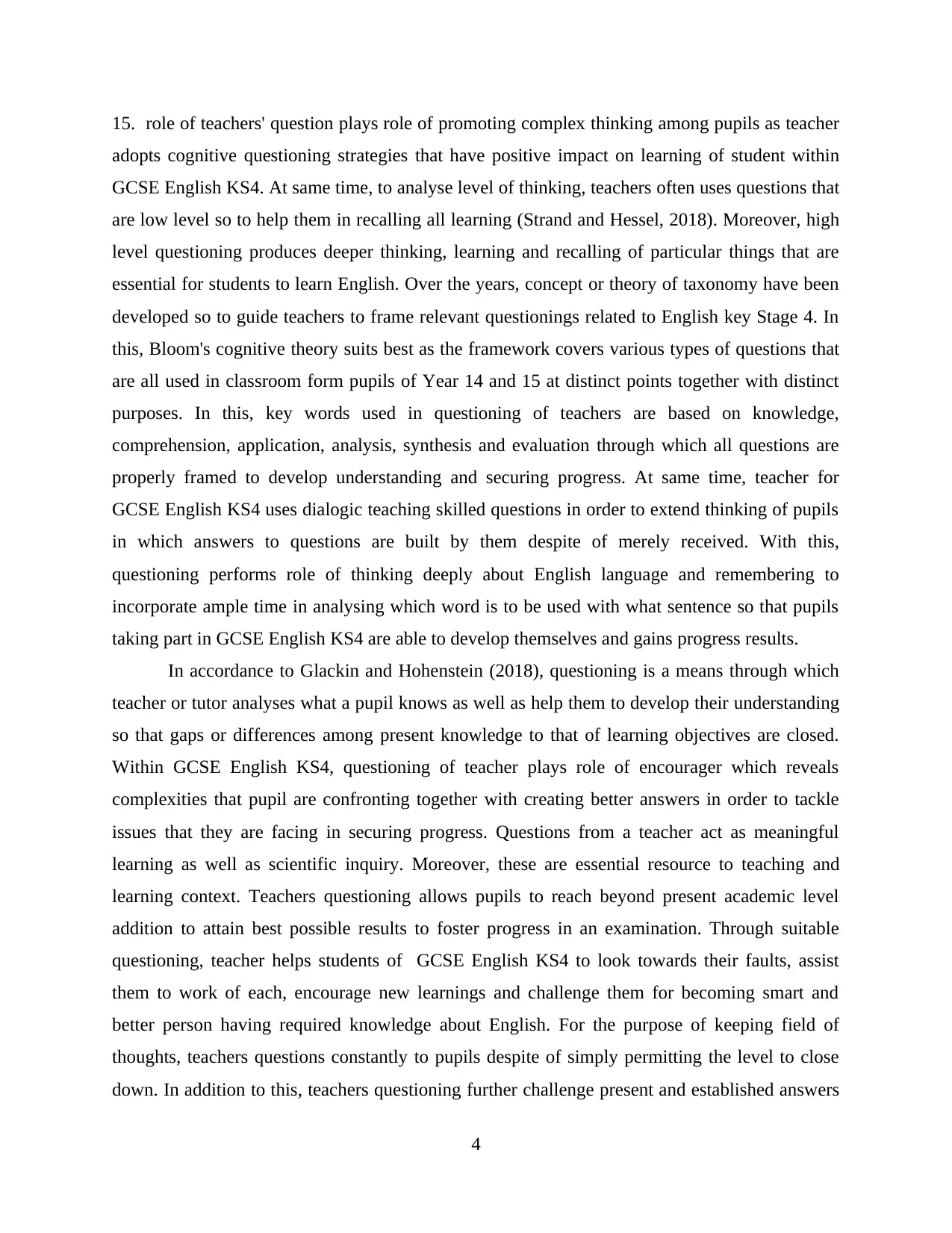
15. role of teachers' question plays role of promoting complex thinking among pupils as teacher
adopts cognitive questioning strategies that have positive impact on learning of student within
GCSE English KS4. At same time, to analyse level of thinking, teachers often uses questions that
are low level so to help them in recalling all learning (Strand and Hessel, 2018). Moreover, high
level questioning produces deeper thinking, learning and recalling of particular things that are
essential for students to learn English. Over the years, concept or theory of taxonomy have been
developed so to guide teachers to frame relevant questionings related to English key Stage 4. In
this, Bloom's cognitive theory suits best as the framework covers various types of questions that
are all used in classroom form pupils of Year 14 and 15 at distinct points together with distinct
purposes. In this, key words used in questioning of teachers are based on knowledge,
comprehension, application, analysis, synthesis and evaluation through which all questions are
properly framed to develop understanding and securing progress. At same time, teacher for
GCSE English KS4 uses dialogic teaching skilled questions in order to extend thinking of pupils
in which answers to questions are built by them despite of merely received. With this,
questioning performs role of thinking deeply about English language and remembering to
incorporate ample time in analysing which word is to be used with what sentence so that pupils
taking part in GCSE English KS4 are able to develop themselves and gains progress results.
In accordance to Glackin and Hohenstein (2018), questioning is a means through which
teacher or tutor analyses what a pupil knows as well as help them to develop their understanding
so that gaps or differences among present knowledge to that of learning objectives are closed.
Within GCSE English KS4, questioning of teacher plays role of encourager which reveals
complexities that pupil are confronting together with creating better answers in order to tackle
issues that they are facing in securing progress. Questions from a teacher act as meaningful
learning as well as scientific inquiry. Moreover, these are essential resource to teaching and
learning context. Teachers questioning allows pupils to reach beyond present academic level
addition to attain best possible results to foster progress in an examination. Through suitable
questioning, teacher helps students of GCSE English KS4 to look towards their faults, assist
them to work of each, encourage new learnings and challenge them for becoming smart and
better person having required knowledge about English. For the purpose of keeping field of
thoughts, teachers questions constantly to pupils despite of simply permitting the level to close
down. In addition to this, teachers questioning further challenge present and established answers
4
adopts cognitive questioning strategies that have positive impact on learning of student within
GCSE English KS4. At same time, to analyse level of thinking, teachers often uses questions that
are low level so to help them in recalling all learning (Strand and Hessel, 2018). Moreover, high
level questioning produces deeper thinking, learning and recalling of particular things that are
essential for students to learn English. Over the years, concept or theory of taxonomy have been
developed so to guide teachers to frame relevant questionings related to English key Stage 4. In
this, Bloom's cognitive theory suits best as the framework covers various types of questions that
are all used in classroom form pupils of Year 14 and 15 at distinct points together with distinct
purposes. In this, key words used in questioning of teachers are based on knowledge,
comprehension, application, analysis, synthesis and evaluation through which all questions are
properly framed to develop understanding and securing progress. At same time, teacher for
GCSE English KS4 uses dialogic teaching skilled questions in order to extend thinking of pupils
in which answers to questions are built by them despite of merely received. With this,
questioning performs role of thinking deeply about English language and remembering to
incorporate ample time in analysing which word is to be used with what sentence so that pupils
taking part in GCSE English KS4 are able to develop themselves and gains progress results.
In accordance to Glackin and Hohenstein (2018), questioning is a means through which
teacher or tutor analyses what a pupil knows as well as help them to develop their understanding
so that gaps or differences among present knowledge to that of learning objectives are closed.
Within GCSE English KS4, questioning of teacher plays role of encourager which reveals
complexities that pupil are confronting together with creating better answers in order to tackle
issues that they are facing in securing progress. Questions from a teacher act as meaningful
learning as well as scientific inquiry. Moreover, these are essential resource to teaching and
learning context. Teachers questioning allows pupils to reach beyond present academic level
addition to attain best possible results to foster progress in an examination. Through suitable
questioning, teacher helps students of GCSE English KS4 to look towards their faults, assist
them to work of each, encourage new learnings and challenge them for becoming smart and
better person having required knowledge about English. For the purpose of keeping field of
thoughts, teachers questions constantly to pupils despite of simply permitting the level to close
down. In addition to this, teachers questioning further challenge present and established answers
4
⊘ This is a preview!⊘
Do you want full access?
Subscribe today to unlock all pages.

Trusted by 1+ million students worldwide
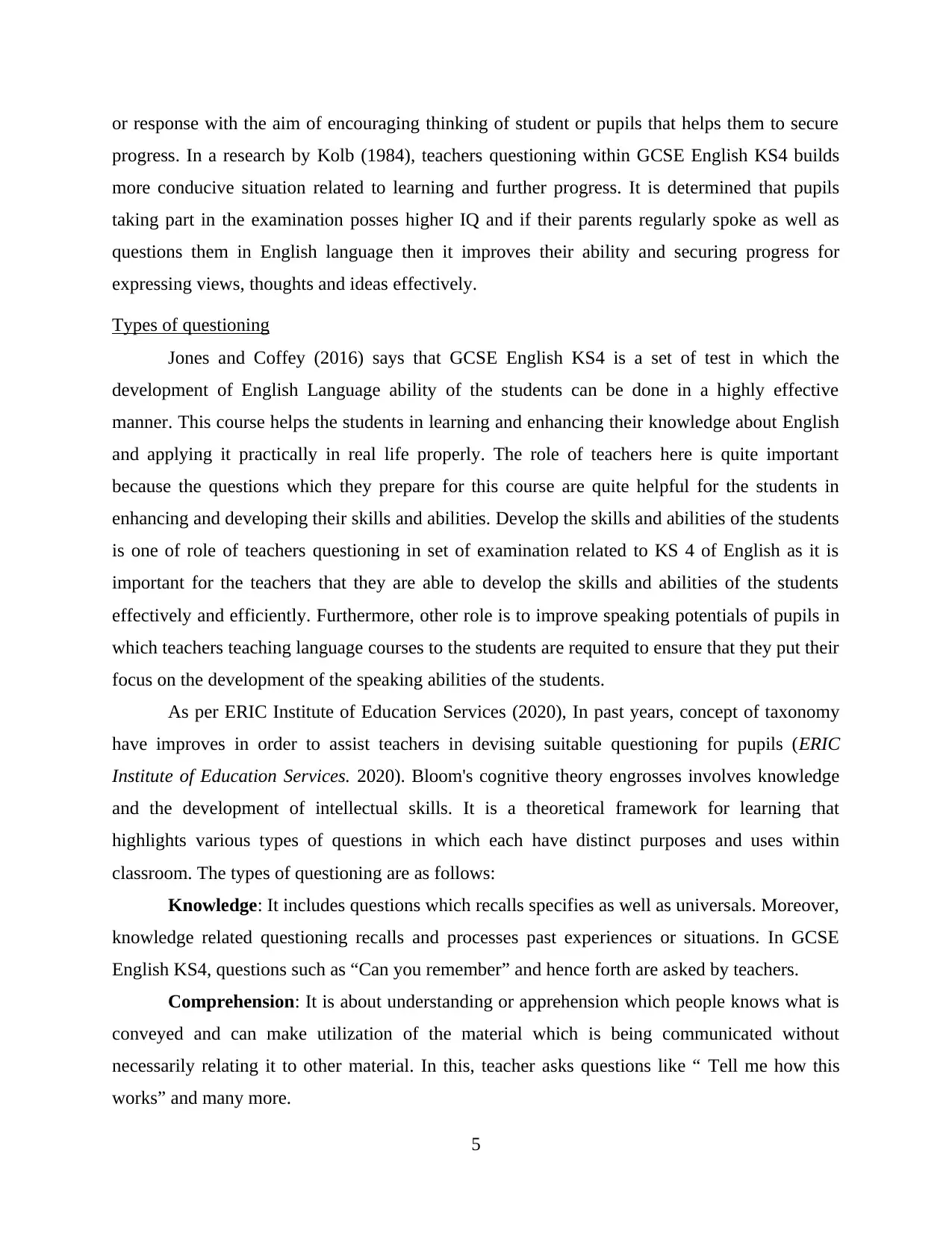
or response with the aim of encouraging thinking of student or pupils that helps them to secure
progress. In a research by Kolb (1984), teachers questioning within GCSE English KS4 builds
more conducive situation related to learning and further progress. It is determined that pupils
taking part in the examination posses higher IQ and if their parents regularly spoke as well as
questions them in English language then it improves their ability and securing progress for
expressing views, thoughts and ideas effectively.
Types of questioning
Jones and Coffey (2016) says that GCSE English KS4 is a set of test in which the
development of English Language ability of the students can be done in a highly effective
manner. This course helps the students in learning and enhancing their knowledge about English
and applying it practically in real life properly. The role of teachers here is quite important
because the questions which they prepare for this course are quite helpful for the students in
enhancing and developing their skills and abilities. Develop the skills and abilities of the students
is one of role of teachers questioning in set of examination related to KS 4 of English as it is
important for the teachers that they are able to develop the skills and abilities of the students
effectively and efficiently. Furthermore, other role is to improve speaking potentials of pupils in
which teachers teaching language courses to the students are requited to ensure that they put their
focus on the development of the speaking abilities of the students.
As per ERIC Institute of Education Services (2020), In past years, concept of taxonomy
have improves in order to assist teachers in devising suitable questioning for pupils (ERIC
Institute of Education Services. 2020). Bloom's cognitive theory engrosses involves knowledge
and the development of intellectual skills. It is a theoretical framework for learning that
highlights various types of questions in which each have distinct purposes and uses within
classroom. The types of questioning are as follows:
Knowledge: It includes questions which recalls specifies as well as universals. Moreover,
knowledge related questioning recalls and processes past experiences or situations. In GCSE
English KS4, questions such as “Can you remember” and hence forth are asked by teachers.
Comprehension: It is about understanding or apprehension which people knows what is
conveyed and can make utilization of the material which is being communicated without
necessarily relating it to other material. In this, teacher asks questions like “ Tell me how this
works” and many more.
5
progress. In a research by Kolb (1984), teachers questioning within GCSE English KS4 builds
more conducive situation related to learning and further progress. It is determined that pupils
taking part in the examination posses higher IQ and if their parents regularly spoke as well as
questions them in English language then it improves their ability and securing progress for
expressing views, thoughts and ideas effectively.
Types of questioning
Jones and Coffey (2016) says that GCSE English KS4 is a set of test in which the
development of English Language ability of the students can be done in a highly effective
manner. This course helps the students in learning and enhancing their knowledge about English
and applying it practically in real life properly. The role of teachers here is quite important
because the questions which they prepare for this course are quite helpful for the students in
enhancing and developing their skills and abilities. Develop the skills and abilities of the students
is one of role of teachers questioning in set of examination related to KS 4 of English as it is
important for the teachers that they are able to develop the skills and abilities of the students
effectively and efficiently. Furthermore, other role is to improve speaking potentials of pupils in
which teachers teaching language courses to the students are requited to ensure that they put their
focus on the development of the speaking abilities of the students.
As per ERIC Institute of Education Services (2020), In past years, concept of taxonomy
have improves in order to assist teachers in devising suitable questioning for pupils (ERIC
Institute of Education Services. 2020). Bloom's cognitive theory engrosses involves knowledge
and the development of intellectual skills. It is a theoretical framework for learning that
highlights various types of questions in which each have distinct purposes and uses within
classroom. The types of questioning are as follows:
Knowledge: It includes questions which recalls specifies as well as universals. Moreover,
knowledge related questioning recalls and processes past experiences or situations. In GCSE
English KS4, questions such as “Can you remember” and hence forth are asked by teachers.
Comprehension: It is about understanding or apprehension which people knows what is
conveyed and can make utilization of the material which is being communicated without
necessarily relating it to other material. In this, teacher asks questions like “ Tell me how this
works” and many more.
5
Paraphrase This Document
Need a fresh take? Get an instant paraphrase of this document with our AI Paraphraser
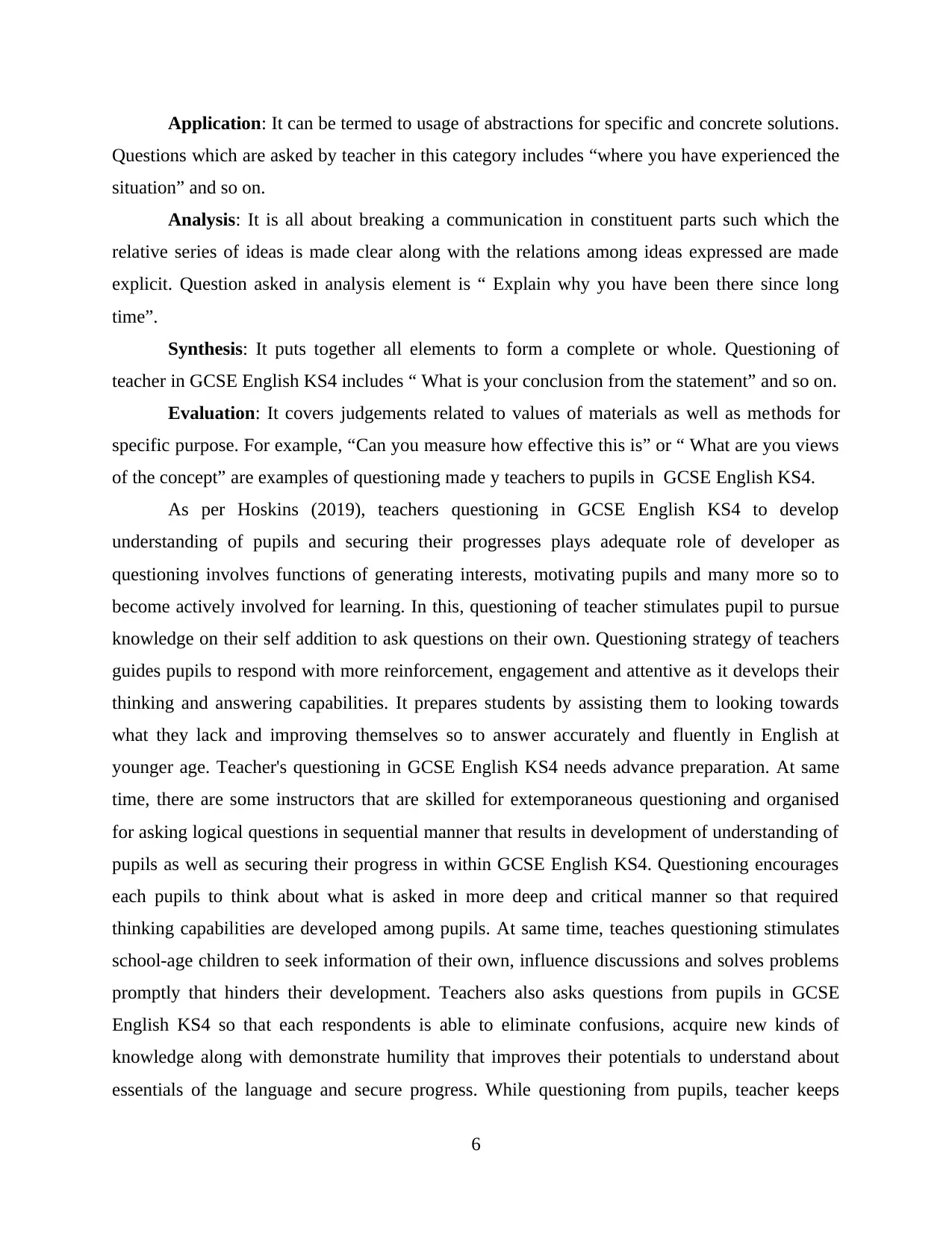
Application: It can be termed to usage of abstractions for specific and concrete solutions.
Questions which are asked by teacher in this category includes “where you have experienced the
situation” and so on.
Analysis: It is all about breaking a communication in constituent parts such which the
relative series of ideas is made clear along with the relations among ideas expressed are made
explicit. Question asked in analysis element is “ Explain why you have been there since long
time”.
Synthesis: It puts together all elements to form a complete or whole. Questioning of
teacher in GCSE English KS4 includes “ What is your conclusion from the statement” and so on.
Evaluation: It covers judgements related to values of materials as well as methods for
specific purpose. For example, “Can you measure how effective this is” or “ What are you views
of the concept” are examples of questioning made y teachers to pupils in GCSE English KS4.
As per Hoskins (2019), teachers questioning in GCSE English KS4 to develop
understanding of pupils and securing their progresses plays adequate role of developer as
questioning involves functions of generating interests, motivating pupils and many more so to
become actively involved for learning. In this, questioning of teacher stimulates pupil to pursue
knowledge on their self addition to ask questions on their own. Questioning strategy of teachers
guides pupils to respond with more reinforcement, engagement and attentive as it develops their
thinking and answering capabilities. It prepares students by assisting them to looking towards
what they lack and improving themselves so to answer accurately and fluently in English at
younger age. Teacher's questioning in GCSE English KS4 needs advance preparation. At same
time, there are some instructors that are skilled for extemporaneous questioning and organised
for asking logical questions in sequential manner that results in development of understanding of
pupils as well as securing their progress in within GCSE English KS4. Questioning encourages
each pupils to think about what is asked in more deep and critical manner so that required
thinking capabilities are developed among pupils. At same time, teaches questioning stimulates
school-age children to seek information of their own, influence discussions and solves problems
promptly that hinders their development. Teachers also asks questions from pupils in GCSE
English KS4 so that each respondents is able to eliminate confusions, acquire new kinds of
knowledge along with demonstrate humility that improves their potentials to understand about
essentials of the language and secure progress. While questioning from pupils, teacher keeps
6
Questions which are asked by teacher in this category includes “where you have experienced the
situation” and so on.
Analysis: It is all about breaking a communication in constituent parts such which the
relative series of ideas is made clear along with the relations among ideas expressed are made
explicit. Question asked in analysis element is “ Explain why you have been there since long
time”.
Synthesis: It puts together all elements to form a complete or whole. Questioning of
teacher in GCSE English KS4 includes “ What is your conclusion from the statement” and so on.
Evaluation: It covers judgements related to values of materials as well as methods for
specific purpose. For example, “Can you measure how effective this is” or “ What are you views
of the concept” are examples of questioning made y teachers to pupils in GCSE English KS4.
As per Hoskins (2019), teachers questioning in GCSE English KS4 to develop
understanding of pupils and securing their progresses plays adequate role of developer as
questioning involves functions of generating interests, motivating pupils and many more so to
become actively involved for learning. In this, questioning of teacher stimulates pupil to pursue
knowledge on their self addition to ask questions on their own. Questioning strategy of teachers
guides pupils to respond with more reinforcement, engagement and attentive as it develops their
thinking and answering capabilities. It prepares students by assisting them to looking towards
what they lack and improving themselves so to answer accurately and fluently in English at
younger age. Teacher's questioning in GCSE English KS4 needs advance preparation. At same
time, there are some instructors that are skilled for extemporaneous questioning and organised
for asking logical questions in sequential manner that results in development of understanding of
pupils as well as securing their progress in within GCSE English KS4. Questioning encourages
each pupils to think about what is asked in more deep and critical manner so that required
thinking capabilities are developed among pupils. At same time, teaches questioning stimulates
school-age children to seek information of their own, influence discussions and solves problems
promptly that hinders their development. Teachers also asks questions from pupils in GCSE
English KS4 so that each respondents is able to eliminate confusions, acquire new kinds of
knowledge along with demonstrate humility that improves their potentials to understand about
essentials of the language and secure progress. While questioning from pupils, teacher keeps
6
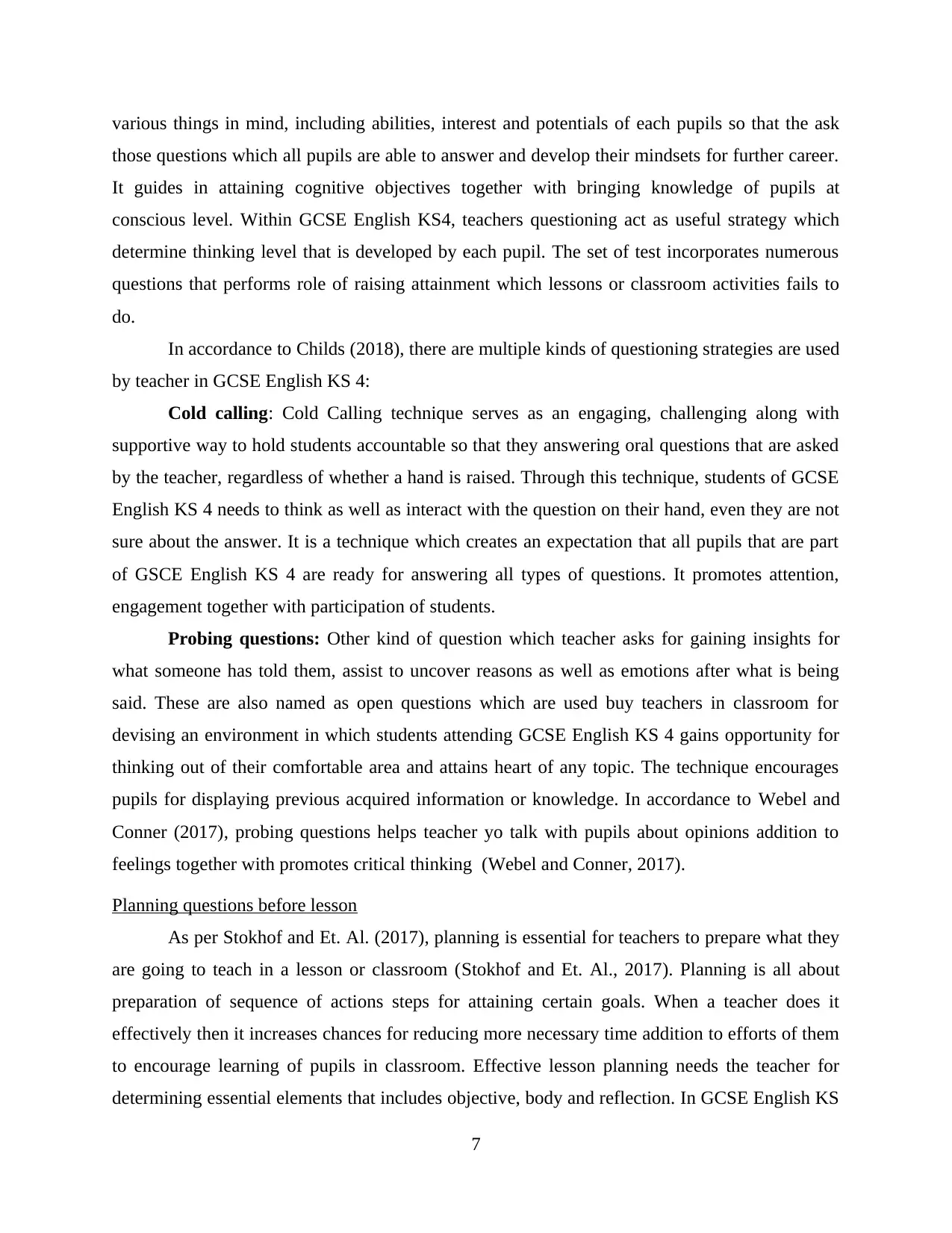
various things in mind, including abilities, interest and potentials of each pupils so that the ask
those questions which all pupils are able to answer and develop their mindsets for further career.
It guides in attaining cognitive objectives together with bringing knowledge of pupils at
conscious level. Within GCSE English KS4, teachers questioning act as useful strategy which
determine thinking level that is developed by each pupil. The set of test incorporates numerous
questions that performs role of raising attainment which lessons or classroom activities fails to
do.
In accordance to Childs (2018), there are multiple kinds of questioning strategies are used
by teacher in GCSE English KS 4:
Cold calling: Cold Calling technique serves as an engaging, challenging along with
supportive way to hold students accountable so that they answering oral questions that are asked
by the teacher, regardless of whether a hand is raised. Through this technique, students of GCSE
English KS 4 needs to think as well as interact with the question on their hand, even they are not
sure about the answer. It is a technique which creates an expectation that all pupils that are part
of GSCE English KS 4 are ready for answering all types of questions. It promotes attention,
engagement together with participation of students.
Probing questions: Other kind of question which teacher asks for gaining insights for
what someone has told them, assist to uncover reasons as well as emotions after what is being
said. These are also named as open questions which are used buy teachers in classroom for
devising an environment in which students attending GCSE English KS 4 gains opportunity for
thinking out of their comfortable area and attains heart of any topic. The technique encourages
pupils for displaying previous acquired information or knowledge. In accordance to Webel and
Conner (2017), probing questions helps teacher yo talk with pupils about opinions addition to
feelings together with promotes critical thinking (Webel and Conner, 2017).
Planning questions before lesson
As per Stokhof and Et. Al. (2017), planning is essential for teachers to prepare what they
are going to teach in a lesson or classroom (Stokhof and Et. Al., 2017). Planning is all about
preparation of sequence of actions steps for attaining certain goals. When a teacher does it
effectively then it increases chances for reducing more necessary time addition to efforts of them
to encourage learning of pupils in classroom. Effective lesson planning needs the teacher for
determining essential elements that includes objective, body and reflection. In GCSE English KS
7
those questions which all pupils are able to answer and develop their mindsets for further career.
It guides in attaining cognitive objectives together with bringing knowledge of pupils at
conscious level. Within GCSE English KS4, teachers questioning act as useful strategy which
determine thinking level that is developed by each pupil. The set of test incorporates numerous
questions that performs role of raising attainment which lessons or classroom activities fails to
do.
In accordance to Childs (2018), there are multiple kinds of questioning strategies are used
by teacher in GCSE English KS 4:
Cold calling: Cold Calling technique serves as an engaging, challenging along with
supportive way to hold students accountable so that they answering oral questions that are asked
by the teacher, regardless of whether a hand is raised. Through this technique, students of GCSE
English KS 4 needs to think as well as interact with the question on their hand, even they are not
sure about the answer. It is a technique which creates an expectation that all pupils that are part
of GSCE English KS 4 are ready for answering all types of questions. It promotes attention,
engagement together with participation of students.
Probing questions: Other kind of question which teacher asks for gaining insights for
what someone has told them, assist to uncover reasons as well as emotions after what is being
said. These are also named as open questions which are used buy teachers in classroom for
devising an environment in which students attending GCSE English KS 4 gains opportunity for
thinking out of their comfortable area and attains heart of any topic. The technique encourages
pupils for displaying previous acquired information or knowledge. In accordance to Webel and
Conner (2017), probing questions helps teacher yo talk with pupils about opinions addition to
feelings together with promotes critical thinking (Webel and Conner, 2017).
Planning questions before lesson
As per Stokhof and Et. Al. (2017), planning is essential for teachers to prepare what they
are going to teach in a lesson or classroom (Stokhof and Et. Al., 2017). Planning is all about
preparation of sequence of actions steps for attaining certain goals. When a teacher does it
effectively then it increases chances for reducing more necessary time addition to efforts of them
to encourage learning of pupils in classroom. Effective lesson planning needs the teacher for
determining essential elements that includes objective, body and reflection. In GCSE English KS
7
⊘ This is a preview!⊘
Do you want full access?
Subscribe today to unlock all pages.

Trusted by 1+ million students worldwide
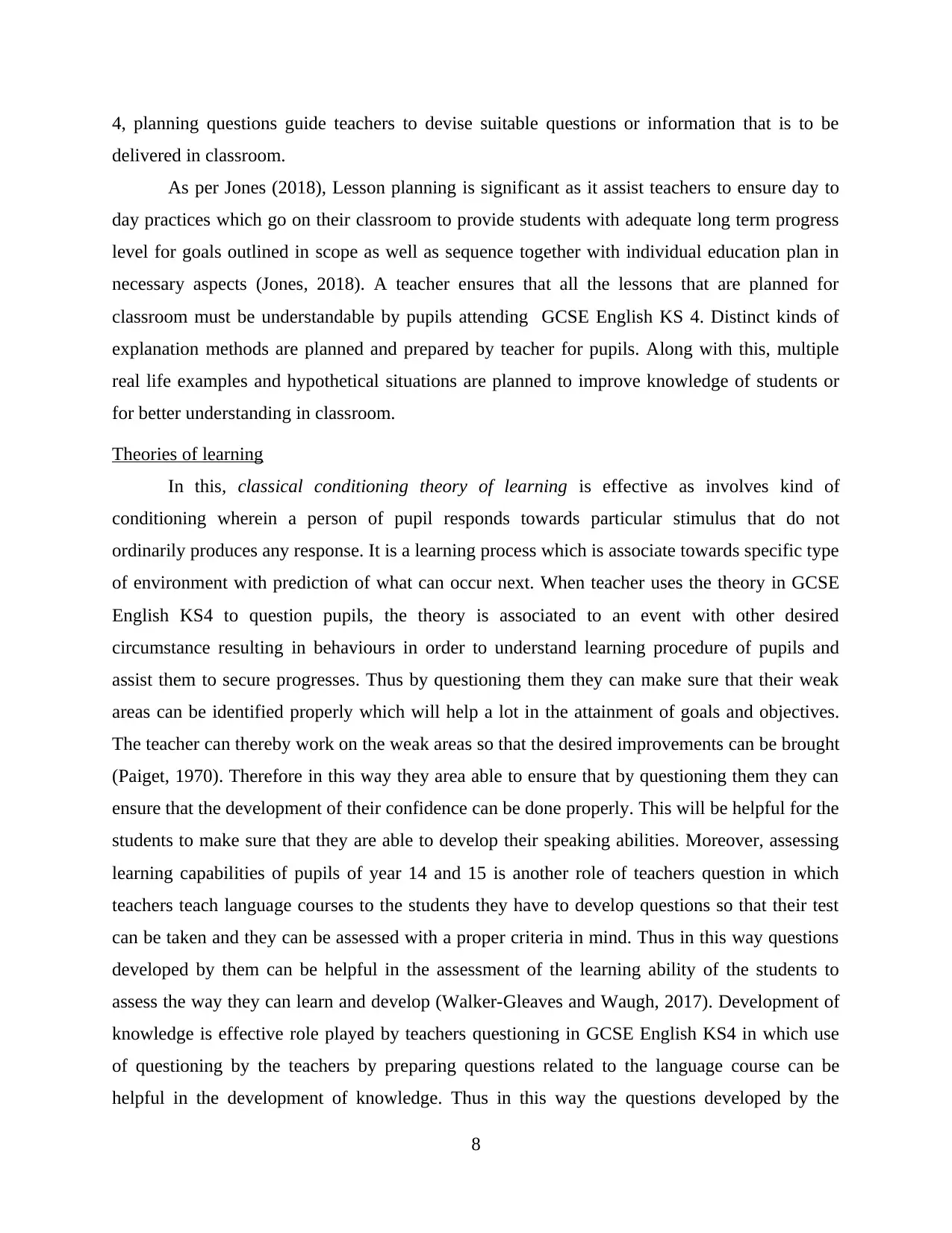
4, planning questions guide teachers to devise suitable questions or information that is to be
delivered in classroom.
As per Jones (2018), Lesson planning is significant as it assist teachers to ensure day to
day practices which go on their classroom to provide students with adequate long term progress
level for goals outlined in scope as well as sequence together with individual education plan in
necessary aspects (Jones, 2018). A teacher ensures that all the lessons that are planned for
classroom must be understandable by pupils attending GCSE English KS 4. Distinct kinds of
explanation methods are planned and prepared by teacher for pupils. Along with this, multiple
real life examples and hypothetical situations are planned to improve knowledge of students or
for better understanding in classroom.
Theories of learning
In this, classical conditioning theory of learning is effective as involves kind of
conditioning wherein a person of pupil responds towards particular stimulus that do not
ordinarily produces any response. It is a learning process which is associate towards specific type
of environment with prediction of what can occur next. When teacher uses the theory in GCSE
English KS4 to question pupils, the theory is associated to an event with other desired
circumstance resulting in behaviours in order to understand learning procedure of pupils and
assist them to secure progresses. Thus by questioning them they can make sure that their weak
areas can be identified properly which will help a lot in the attainment of goals and objectives.
The teacher can thereby work on the weak areas so that the desired improvements can be brought
(Paiget, 1970). Therefore in this way they area able to ensure that by questioning them they can
ensure that the development of their confidence can be done properly. This will be helpful for the
students to make sure that they are able to develop their speaking abilities. Moreover, assessing
learning capabilities of pupils of year 14 and 15 is another role of teachers question in which
teachers teach language courses to the students they have to develop questions so that their test
can be taken and they can be assessed with a proper criteria in mind. Thus in this way questions
developed by them can be helpful in the assessment of the learning ability of the students to
assess the way they can learn and develop (Walker-Gleaves and Waugh, 2017). Development of
knowledge is effective role played by teachers questioning in GCSE English KS4 in which use
of questioning by the teachers by preparing questions related to the language course can be
helpful in the development of knowledge. Thus in this way the questions developed by the
8
delivered in classroom.
As per Jones (2018), Lesson planning is significant as it assist teachers to ensure day to
day practices which go on their classroom to provide students with adequate long term progress
level for goals outlined in scope as well as sequence together with individual education plan in
necessary aspects (Jones, 2018). A teacher ensures that all the lessons that are planned for
classroom must be understandable by pupils attending GCSE English KS 4. Distinct kinds of
explanation methods are planned and prepared by teacher for pupils. Along with this, multiple
real life examples and hypothetical situations are planned to improve knowledge of students or
for better understanding in classroom.
Theories of learning
In this, classical conditioning theory of learning is effective as involves kind of
conditioning wherein a person of pupil responds towards particular stimulus that do not
ordinarily produces any response. It is a learning process which is associate towards specific type
of environment with prediction of what can occur next. When teacher uses the theory in GCSE
English KS4 to question pupils, the theory is associated to an event with other desired
circumstance resulting in behaviours in order to understand learning procedure of pupils and
assist them to secure progresses. Thus by questioning them they can make sure that their weak
areas can be identified properly which will help a lot in the attainment of goals and objectives.
The teacher can thereby work on the weak areas so that the desired improvements can be brought
(Paiget, 1970). Therefore in this way they area able to ensure that by questioning them they can
ensure that the development of their confidence can be done properly. This will be helpful for the
students to make sure that they are able to develop their speaking abilities. Moreover, assessing
learning capabilities of pupils of year 14 and 15 is another role of teachers question in which
teachers teach language courses to the students they have to develop questions so that their test
can be taken and they can be assessed with a proper criteria in mind. Thus in this way questions
developed by them can be helpful in the assessment of the learning ability of the students to
assess the way they can learn and develop (Walker-Gleaves and Waugh, 2017). Development of
knowledge is effective role played by teachers questioning in GCSE English KS4 in which use
of questioning by the teachers by preparing questions related to the language course can be
helpful in the development of knowledge. Thus in this way the questions developed by the
8
Paraphrase This Document
Need a fresh take? Get an instant paraphrase of this document with our AI Paraphraser
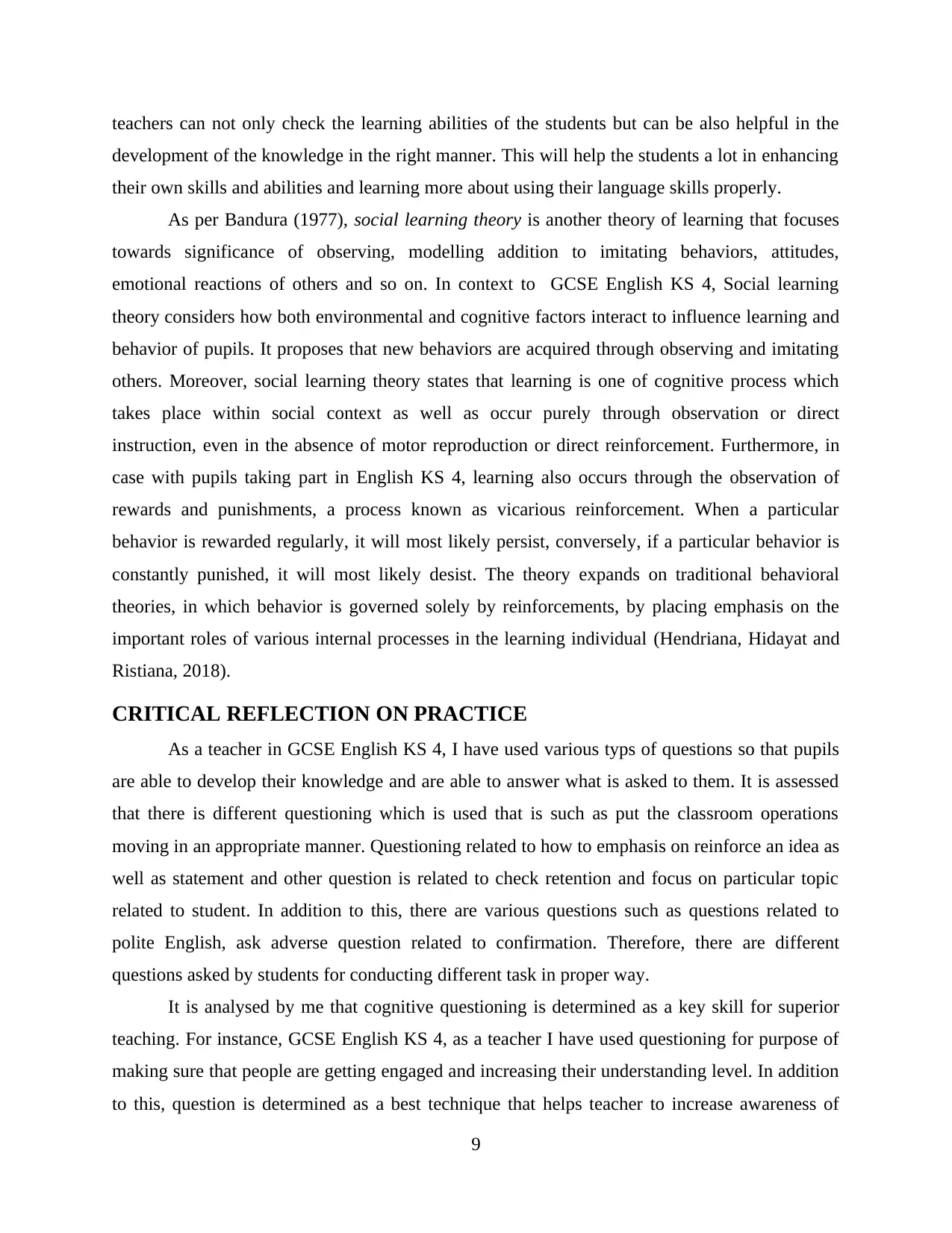
teachers can not only check the learning abilities of the students but can be also helpful in the
development of the knowledge in the right manner. This will help the students a lot in enhancing
their own skills and abilities and learning more about using their language skills properly.
As per Bandura (1977), social learning theory is another theory of learning that focuses
towards significance of observing, modelling addition to imitating behaviors, attitudes,
emotional reactions of others and so on. In context to GCSE English KS 4, Social learning
theory considers how both environmental and cognitive factors interact to influence learning and
behavior of pupils. It proposes that new behaviors are acquired through observing and imitating
others. Moreover, social learning theory states that learning is one of cognitive process which
takes place within social context as well as occur purely through observation or direct
instruction, even in the absence of motor reproduction or direct reinforcement. Furthermore, in
case with pupils taking part in English KS 4, learning also occurs through the observation of
rewards and punishments, a process known as vicarious reinforcement. When a particular
behavior is rewarded regularly, it will most likely persist, conversely, if a particular behavior is
constantly punished, it will most likely desist. The theory expands on traditional behavioral
theories, in which behavior is governed solely by reinforcements, by placing emphasis on the
important roles of various internal processes in the learning individual (Hendriana, Hidayat and
Ristiana, 2018).
CRITICAL REFLECTION ON PRACTICE
As a teacher in GCSE English KS 4, I have used various typs of questions so that pupils
are able to develop their knowledge and are able to answer what is asked to them. It is assessed
that there is different questioning which is used that is such as put the classroom operations
moving in an appropriate manner. Questioning related to how to emphasis on reinforce an idea as
well as statement and other question is related to check retention and focus on particular topic
related to student. In addition to this, there are various questions such as questions related to
polite English, ask adverse question related to confirmation. Therefore, there are different
questions asked by students for conducting different task in proper way.
It is analysed by me that cognitive questioning is determined as a key skill for superior
teaching. For instance, GCSE English KS 4, as a teacher I have used questioning for purpose of
making sure that people are getting engaged and increasing their understanding level. In addition
to this, question is determined as a best technique that helps teacher to increase awareness of
9
development of the knowledge in the right manner. This will help the students a lot in enhancing
their own skills and abilities and learning more about using their language skills properly.
As per Bandura (1977), social learning theory is another theory of learning that focuses
towards significance of observing, modelling addition to imitating behaviors, attitudes,
emotional reactions of others and so on. In context to GCSE English KS 4, Social learning
theory considers how both environmental and cognitive factors interact to influence learning and
behavior of pupils. It proposes that new behaviors are acquired through observing and imitating
others. Moreover, social learning theory states that learning is one of cognitive process which
takes place within social context as well as occur purely through observation or direct
instruction, even in the absence of motor reproduction or direct reinforcement. Furthermore, in
case with pupils taking part in English KS 4, learning also occurs through the observation of
rewards and punishments, a process known as vicarious reinforcement. When a particular
behavior is rewarded regularly, it will most likely persist, conversely, if a particular behavior is
constantly punished, it will most likely desist. The theory expands on traditional behavioral
theories, in which behavior is governed solely by reinforcements, by placing emphasis on the
important roles of various internal processes in the learning individual (Hendriana, Hidayat and
Ristiana, 2018).
CRITICAL REFLECTION ON PRACTICE
As a teacher in GCSE English KS 4, I have used various typs of questions so that pupils
are able to develop their knowledge and are able to answer what is asked to them. It is assessed
that there is different questioning which is used that is such as put the classroom operations
moving in an appropriate manner. Questioning related to how to emphasis on reinforce an idea as
well as statement and other question is related to check retention and focus on particular topic
related to student. In addition to this, there are various questions such as questions related to
polite English, ask adverse question related to confirmation. Therefore, there are different
questions asked by students for conducting different task in proper way.
It is analysed by me that cognitive questioning is determined as a key skill for superior
teaching. For instance, GCSE English KS 4, as a teacher I have used questioning for purpose of
making sure that people are getting engaged and increasing their understanding level. In addition
to this, question is determined as a best technique that helps teacher to increase awareness of
9
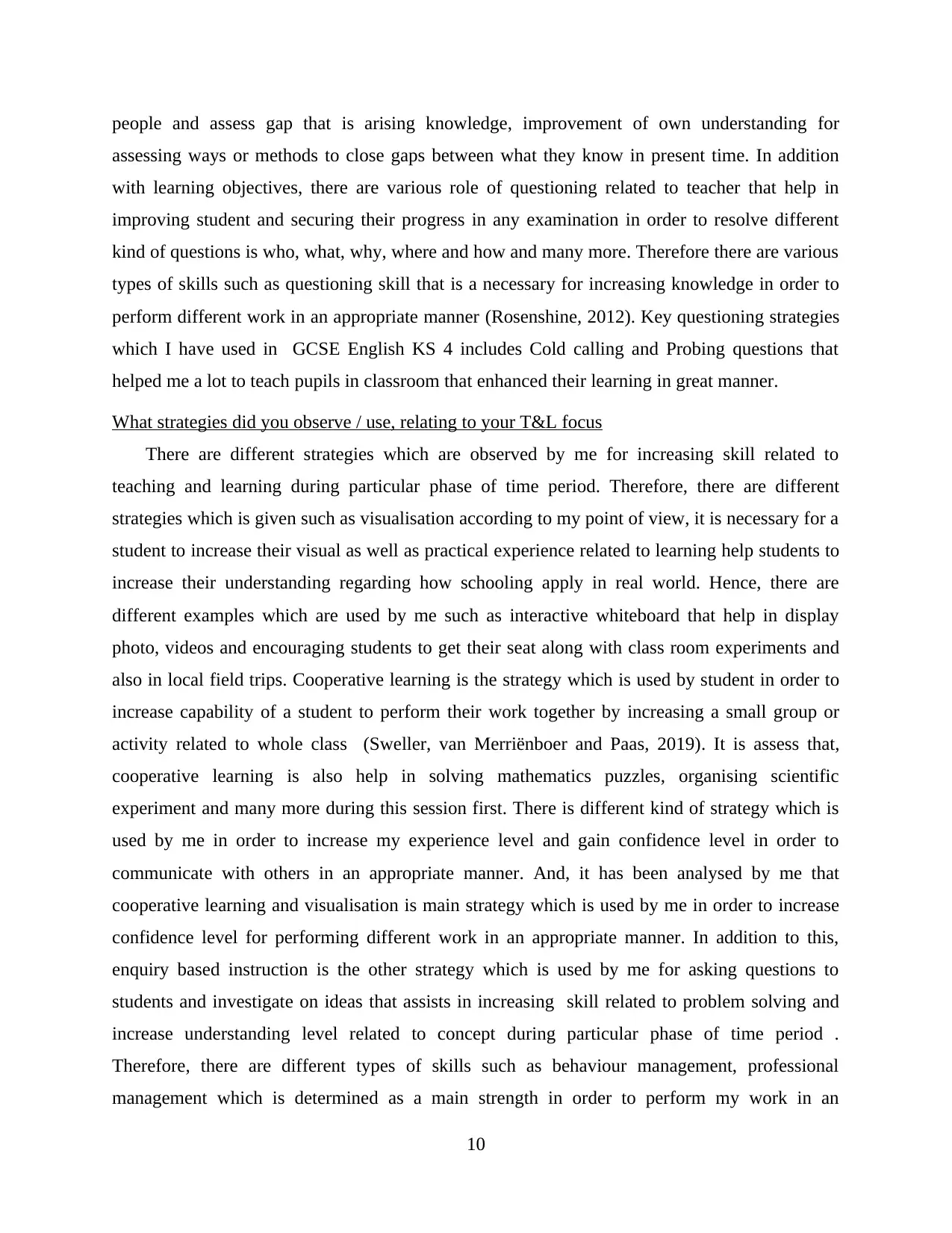
people and assess gap that is arising knowledge, improvement of own understanding for
assessing ways or methods to close gaps between what they know in present time. In addition
with learning objectives, there are various role of questioning related to teacher that help in
improving student and securing their progress in any examination in order to resolve different
kind of questions is who, what, why, where and how and many more. Therefore there are various
types of skills such as questioning skill that is a necessary for increasing knowledge in order to
perform different work in an appropriate manner (Rosenshine, 2012). Key questioning strategies
which I have used in GCSE English KS 4 includes Cold calling and Probing questions that
helped me a lot to teach pupils in classroom that enhanced their learning in great manner.
What strategies did you observe / use, relating to your T&L focus
There are different strategies which are observed by me for increasing skill related to
teaching and learning during particular phase of time period. Therefore, there are different
strategies which is given such as visualisation according to my point of view, it is necessary for a
student to increase their visual as well as practical experience related to learning help students to
increase their understanding regarding how schooling apply in real world. Hence, there are
different examples which are used by me such as interactive whiteboard that help in display
photo, videos and encouraging students to get their seat along with class room experiments and
also in local field trips. Cooperative learning is the strategy which is used by student in order to
increase capability of a student to perform their work together by increasing a small group or
activity related to whole class (Sweller, van Merriënboer and Paas, 2019). It is assess that,
cooperative learning is also help in solving mathematics puzzles, organising scientific
experiment and many more during this session first. There is different kind of strategy which is
used by me in order to increase my experience level and gain confidence level in order to
communicate with others in an appropriate manner. And, it has been analysed by me that
cooperative learning and visualisation is main strategy which is used by me in order to increase
confidence level for performing different work in an appropriate manner. In addition to this,
enquiry based instruction is the other strategy which is used by me for asking questions to
students and investigate on ideas that assists in increasing skill related to problem solving and
increase understanding level related to concept during particular phase of time period .
Therefore, there are different types of skills such as behaviour management, professional
management which is determined as a main strength in order to perform my work in an
10
assessing ways or methods to close gaps between what they know in present time. In addition
with learning objectives, there are various role of questioning related to teacher that help in
improving student and securing their progress in any examination in order to resolve different
kind of questions is who, what, why, where and how and many more. Therefore there are various
types of skills such as questioning skill that is a necessary for increasing knowledge in order to
perform different work in an appropriate manner (Rosenshine, 2012). Key questioning strategies
which I have used in GCSE English KS 4 includes Cold calling and Probing questions that
helped me a lot to teach pupils in classroom that enhanced their learning in great manner.
What strategies did you observe / use, relating to your T&L focus
There are different strategies which are observed by me for increasing skill related to
teaching and learning during particular phase of time period. Therefore, there are different
strategies which is given such as visualisation according to my point of view, it is necessary for a
student to increase their visual as well as practical experience related to learning help students to
increase their understanding regarding how schooling apply in real world. Hence, there are
different examples which are used by me such as interactive whiteboard that help in display
photo, videos and encouraging students to get their seat along with class room experiments and
also in local field trips. Cooperative learning is the strategy which is used by student in order to
increase capability of a student to perform their work together by increasing a small group or
activity related to whole class (Sweller, van Merriënboer and Paas, 2019). It is assess that,
cooperative learning is also help in solving mathematics puzzles, organising scientific
experiment and many more during this session first. There is different kind of strategy which is
used by me in order to increase my experience level and gain confidence level in order to
communicate with others in an appropriate manner. And, it has been analysed by me that
cooperative learning and visualisation is main strategy which is used by me in order to increase
confidence level for performing different work in an appropriate manner. In addition to this,
enquiry based instruction is the other strategy which is used by me for asking questions to
students and investigate on ideas that assists in increasing skill related to problem solving and
increase understanding level related to concept during particular phase of time period .
Therefore, there are different types of skills such as behaviour management, professional
management which is determined as a main strength in order to perform my work in an
10
⊘ This is a preview!⊘
Do you want full access?
Subscribe today to unlock all pages.

Trusted by 1+ million students worldwide
1 out of 19
Related Documents
Your All-in-One AI-Powered Toolkit for Academic Success.
+13062052269
info@desklib.com
Available 24*7 on WhatsApp / Email
![[object Object]](/_next/static/media/star-bottom.7253800d.svg)
Unlock your academic potential
Copyright © 2020–2026 A2Z Services. All Rights Reserved. Developed and managed by ZUCOL.





